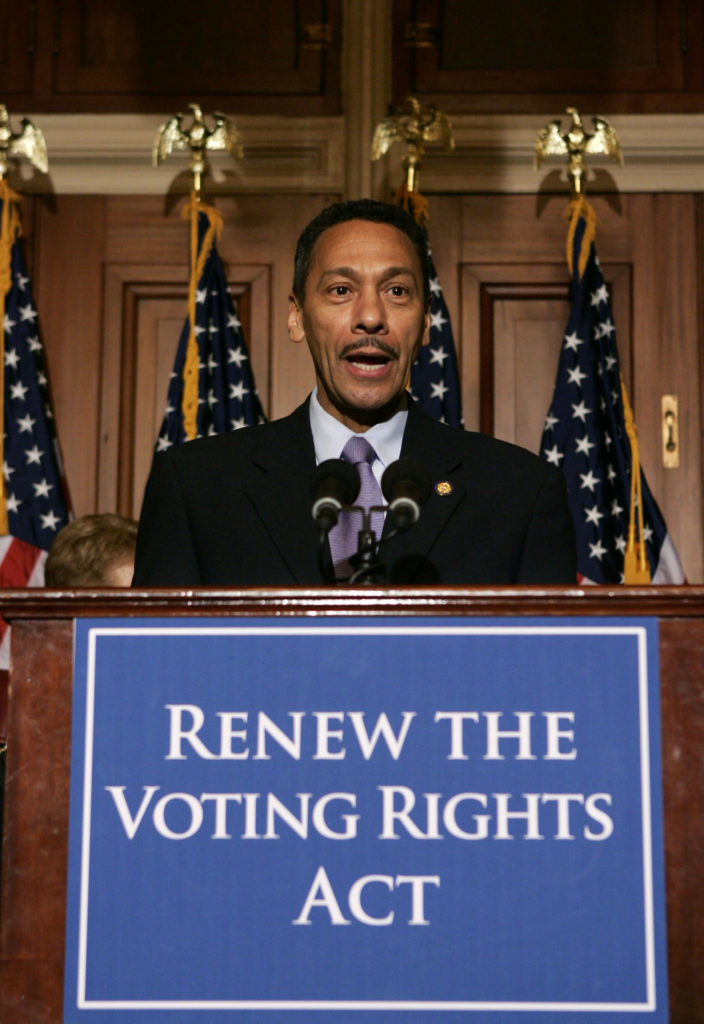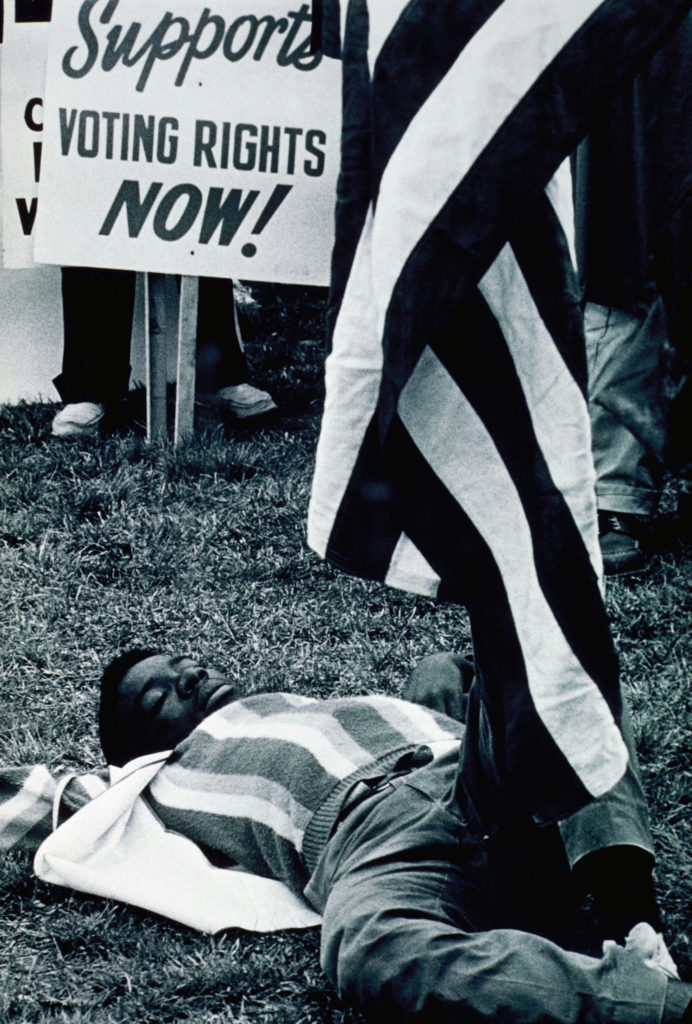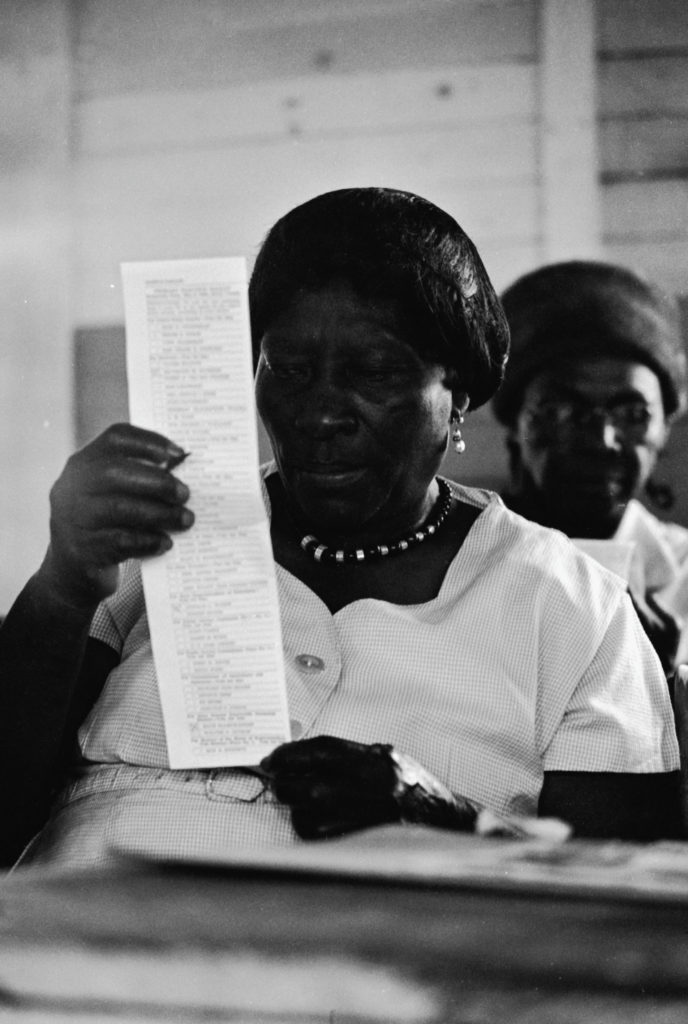Voting Rights Act: Timeline
Learn how the CBC has spent years fighting tirelessly to protect the voting rights of underrepresented people.
1960
Congress passes the Civil Rights Act of 1960. This legislation requires election officials to have all records relating to voter registration. It also permits the Department of Justice to inspect these records. Under this legislation, African Americans who were previously denied the opportunity to vote in their local jurisdictions were afforded the opportunity to apply to a federal court or voting referee for the right to vote.
August 6, 1965
President Lyndon B. Johnson signed the Voting Rights Act of 1965 into law. The act declares that throughout the nation no person shall be denied the right to vote on account of race or color. The Voting Rights Act of 1965 outlawed the requirement that voters take literacy tests to qualify for the right to vote. Other special provisions included the enforcement of this legislation in areas where there had been a history of racial discrimination.
1970
Congress extended Section 5 of the Voting Rights Act for five years. Section 5 focused on the use of discriminatory tests and other devices designed to exclude certain individuals from the voting process. These extensions required that jurisdictions with a history of illegal discrimination obtain permission from either the Justice Department or a panel of federal district court judges before changing any voting practices.
1975
Congress extended Section 5 of the Voting Rights Act for seven more years. The definition of “test or device” was expanded to include the practice of providing election information, including ballots, only in English in states or political subdivisions where members of a single language minority constituted more than five percent of the citizens of voting age.
1982
Congress extended Section 5 of the Voting Rights Act for twenty-five years. Congress also adopted a new standard to determine how jurisdictions could terminate (or “bail out” from) the provisions of Section 4.
1992
The Voting Rights Language Assistance Act was passed. This legislation required bilingual voting materials and expanded coverage to jurisdictions with more than 10,000 voting-age minority citizens who were not proficient in English. This provision also provided an alternative coverage standard for Indians and Alaska Natives. The language minority provisions of Section 203 of the Voting Rights Act were extended for another 15 years. These provisions provided assistance to voters with limited English proficiency.
1992
Congressman John A. Lewis (D-GA) introduced H.R. 1457, a bill to protect the voting rights of homeless citizens.
1993
Congress passes the National Voter Registration Act, also known as the “Motor Voter” Bill. This legislation made registration more uniform and accessible, particularly for minority and low-income voters. It required that states allow voter registration by mail. It also required that states give voters the opportunity to register at other state agencies, such as driver’s license bureaus, welfare offices and unemployment agencies.
1994
Congressman John Conyers (D-MI) introduced H.R. 4093, a bill to secure the voting rights of former felons who have been released from incarceration.
2002
Congress passed the Help America to Vote Act. This legislation sought to improve the administration of federal elections by providing assistance with the administration of certain federal election laws and programs. Since the passage of this legislation, Congressional Black Caucus members have introduced amendments designed to further improve the administration of federal elections in local and state jurisdictions.
2006
CBC members co-sponsored the Fannie Lou Hamer, Rosa Parks, and Coretta Scott King Voting Rights Act Reauthorization and Amendments Act of 2006.
July 2006
The House voted overwhelmingly (390-33) to renew expiring provisions of the Voting Rights Act for an additional 25 years.
2013
The Supreme Court ruled in Shelby County v Holder that Section 4(b) of the Voting Rights Act was unconstitutional. This section required jurisdictions with histories of racial discrimination in voting to received federal approval before making changes to election laws.
2019
House passes the Voting Rights Advancement Act (H.R. 4) to revise parts of the Voting Rights Act that were gutted during the Shelby County decision. It was not brought up for a vote in the Republican-controlled Senate.
2021
The Voting Rights Advancement Act (H.R. 4) is passed in House. Later renamed for former Rep. John Lewis, the legislation would have, among other things, established an updated “rolling” coverage formula that could be triggered nationwide on an ongoing basis.
2021
Senate considered, but did not invoke cloture on, the motion to proceed to the Freedom to Vote Act (S. 2747). The bill included some amendments to the VRA language-minority provisions.
2021
House passes For the People Act (H.R. 1), a version of the Voting Rights Advancement Act first introduced in 2019. The Act included language to expand voting access through tools like automatic and same-day voter registration.
2021
House passes the John R. Lewis Voting Rights Advancement Act (H.R. 4). The legislation combined elements of some of the voting rights amendment bills proposed in the previous few congresses and addressed aspects of campaign finance, election administration, and voting rights.



